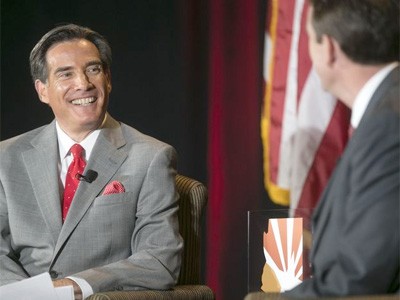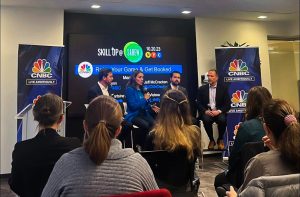Brahm Resnik was really leaning toward medical school as he was deciding where to attend college. Although he had majored in health sciences at CEGEP (part of the Quebec community college system), he chose not to pursue that field.
“Even though I had an aptitude for the sciences, my love was journalism,” Resnik said.

He attended McGill University because it offered a daily student newspaper, a rarity in his home country of Canada. After graduating with a master’s in journalism from Northwestern University, he worked as a deputy business editor for The Milwaukee Journal and Milwaukee Journal Sentinel. He moved onto becoming the business editor of the Rochester (NY) Democrat & Chronicle before arriving at the Arizona Republic in 1999.
Resnik began working for KPNX-TV in in Phoenix in 2001 at the same time he was working at the Republic. He made the full transition to TV in 2005 and became an anchor and reporter. He also hosts the “Sunday Square Off,” a weekend political news program, and “LunchCast,” at noon on weekdays. In addition to business throughout his career, Resnik has covered illegal immigration, politics, business, and Arizona Capitol issues.
Resnik took time to chat with us about his transition into broadcast, how to get real answers, and the challenges of being a moderator.
1. You worked in newspapers for more than 15 years. How was the transition to broadcast, and what advice do you have to reporters making the same change?
Well I’d never been on TV in my life. I had never been in a TV newsroom in my life. I had interned, while at Northwestern, I interned on the Today Show during the 1984 Illinois primaries. I interned there and that was it. But circumstances came together here, had a great opportunity, so I seized it, that was gosh 14 years ago. The big challenges are not much in print prepares you for TV. What kind of prepared me was I was a business editor, so I was used to speaking in front of groups, comfortable ad libbing, and that’s probably it. The make up, the light, the prompter, the whole different writing styles, having to use a camera to do your interviews. I can’t just call somebody up to do an interview. I need to get them in front of a camera. Here I was in a very large market, making mistakes in front of a very large audience. Not that I made a lot, but it’s like learning golf in front of a crowd of people every day. You just have to do it, you make a mistake and move on. You’re visible in a way you aren’t in print… and when you screw up, you’re screwing up in public. Also coming over, you don’t realize how demanding this job is. It is really intense. Far more intense than anything I did in print, day in day out.
It’s tricky because I don’t think what I did, I think what I did is kind of passé. … If you really want to jump over to TV, well you have to get lucky to do what I did because chances are you won’t be hired like this. They knew what they were getting was me and had patience while I grew. If it’s TV you want, you know, life is really teaching yourself and talking to people who can teach you how to do things because nobody over there is going to teach you how to do it and you’re probably not going to go back to school either. …If you’re young, if you’re at Cronkite, you should be learning these things already.
2. People don’t always tell the truth when talking with business reporters. How can a beginning business reporter make sure to get all of the information?
It’s all about homework, and you need to know what they know. You have to ground your questions in fact. Too many young reporters, they go in and ask questions “What do you think about this or what do you think about that?” You need to know what the answer should be to know how to judge the answer you’re actually getting. There’s so many tools available today to do preparation on a person or a subject. There’s no excuse for not doing it. You need to know what the right questions are, you need to know how the subject will probably answer them and what your comeback is. And if you’re not prepared, don’t bother. Don’t do the interview.
“You need to know
what the answer should be
to know how to judge the answer
you’re actually getting.”
I was talking to a judge, and he wanted to know “What are you strategies? What if somebody doesn’t give you an answer?” And I said, “Well, the first time I ask a question, they’re probably going to give me the answer they want to give me. The second time, if I don’t find that answer satisfactory and I ask it again, which I will ask that question again or rephrase it, the second answer is the one they think I want to hear. Okay, then I’ll ask it a third time, and the third time they’re kind of stuck. At this point in my case, the viewer knows he’s not answering the question.” Don’t be afraid. Be persistent because the first time you don’t get the best answer and usually as a rule of thumb, at least in print, you don’t get the best answers until at least 20 minutes into the interview.
3. News organizations tend to be in a competition to get accurate news first, and especially with the Capitol, everybody is covering things like SB1070 or SB1062. How can reporters come up with different story angles when dealing with popular Capitol issues?
You have to be smarter than everybody else. You have to know the subject better than everybody else. You want a diversity of voices. Me telling the story differently is finding somebody who is just a different voice, whose sort of insight you’re not going to get anywhere else. That’s how I tell the story differently, but you have to know the subject. I don’t know any other way to do it, and dig deeply into the subject as deeply as you can, and pay attention to who’s saying things that are interesting, who knows what is going on, and also just the feeling. I did a story a couple weeks ago on all the daca recipients, they were being denied drivers licenses by the governor. … You don’t want the sound of a somebody standing at a podium, you want to talk to people away from that. Talk to them one on one…. I saw several people crying. I pulled one of the gals outside and she again couldn’t stop crying, she was so happy, thrilled that it had happened. And then I didn’t go to the lawyer who argued the case because that’s information I can provide to the viewer … Someone told me once ‘in print, you show me, but in TV, you have to make me feel to be effective.’ I cover politics and that can be hard, but there’s way to get people going, but this was a great example of that. This was a deeply personal moment for all these folks … At news conferences, always, always be observant for the person you think would be a great one-on-one. Otherwise they’re just performers; they’re reading from a script.
4. You host “Sunday Square Off.” What are challenges moderators face that journalists don’t? What are the challenges in being a moderator?
Still a broadcast reporter, just a different type of format. It’s an interview program, it’s a panel discussion. The challenge with the show is keeping it informative, getting the information viewers want and expect, but also keeping it entertaining, engaging. … we need to keep viewers engaged. It needs to be lively, so you need to select your guests carefully, your panel carefully. The real challenge is actually time. You have to figure out, say you have five and a half minutes segments, you have to figure out, I have a guest on, I have to figure out the best five or six questions I’m going to use in a five and a half minute segment. Knowing what that guest is likely to respond, knowing whether that guest is a slow or a fast talker. That’s the way, some people talk really slowly and you need to keep them to go faster and there are strategies for that. The guest, having the right mix of guests from different backgrounds, ideologies, that’s important. … So you got to keep them engaged, got find the right mix of guests, right caliber of guests, and maintain a consistent persona.
5. The Atlantic published an article in June about how audiences say they care about national and economic news, but they really read more soft news. How do you as a broadcast reporter get airtime for business-related stories when other light-hearted stories may get more viewers?
How do I do that? Well I’ve been doing it successfully for many years now. I guess it’s like anything else. What connects with people? What do they care about? And you have to be really disciplined in deciding what they care about, you have to understand your audience. At this point, I know what’s going to work and what’s not going to work, what’s going to reach people and what’s not. Now sometimes I may be wrong by a degree. For example I did a report this week on Adam Kwasman… that went viral like only one other story I’ve seen. … You’re not going to have those moments every day. That’s a once a year thing. Once or twice. It went crazy. That kind of surprised me. You just have to know what good sound is. There’s some luck in that but also really good reporting and connections that we were able to know before he did that that wasn’t a bus full of migrant kids. There were no kids coming. TV is all about sound. You have to know what works on your beat and what’s going to give you the good sound on your beat. It’s what I’ve come to rely on is the back and forth interview and the tough questions, built around a foundation of solid information and reporting. It’s all about the sound….covering big business, I was a business editor, that’s tougher. How do you connect? How do you connect with the viewers? Well it’s “gee whiz” stuff and “what’s the new product,” but more so it’s getting the CEO, putting him on the line and saying, “What the hell is going on here?”









